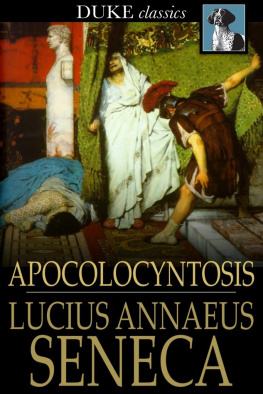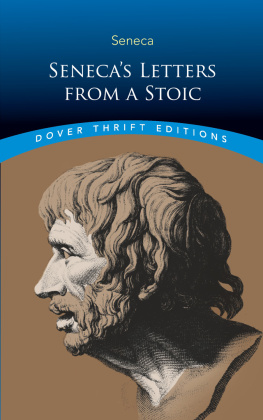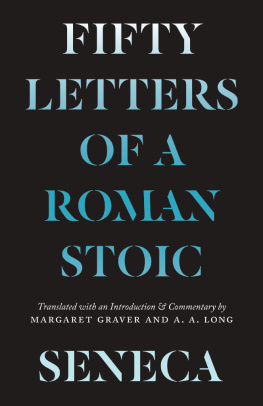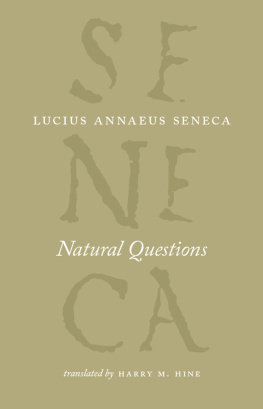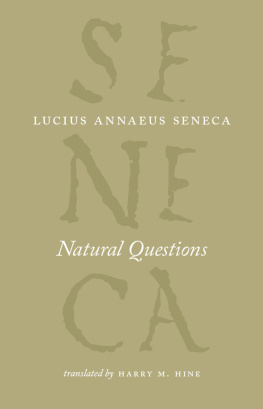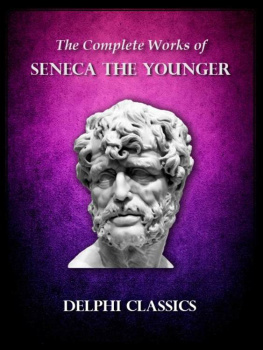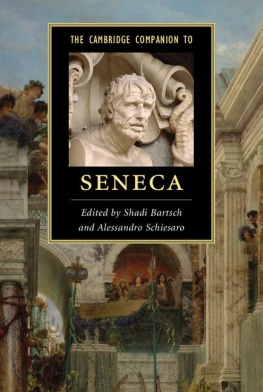APOCOLOCYNTOSIS
THE PUMPKINIFICATION OF CLAUDIUS
* * *
LUCIUS ANNAEUS SENECA
Translated by
W. H. D. ROUSE
*
Apocolocyntosis
The Pumpkinification of Claudius
From a 1920 edition
ISBN 978-1-62011-329-5
Duke Classics
2012 Duke Classics and its licensors. All rights reserved.
While every effort has been used to ensure the accuracy and reliability of the information contained in this edition, Duke Classics does not assume liability or responsibility for any errors or omissions in this book. Duke Classics does not accept responsibility for loss suffered as a result of reliance upon the accuracy or currency of information contained in this book.
Contents
*
Introduction
*
This piece is ascribed to Seneca by ancient tradition; it is impossibleto prove that it is his, and impossible to prove that it is not. Thematter will probably continue to be decided by every one according to hisview of Seneca's character and abilities: in the matters of style and ofsentiment much may be said on both sides. Dion Cassius (lx, 35) says thatSeneca composed an (Greek: apokolokuntosis) or Pumpkinification ofClaudius after his death, the title being a parody of the usual(Greek: apotheosis); but this title is not given in the MSS. of the Ludusde Morte Claudii, nor is there anything in the piece which suits the titlevery well.
As a literary form, the piece belongs to the class calledSatura Menippea, a satiric medley in prose and verse.
This text is that of Buecheler, with a few trifling changes, which areindicated in the notes. We have been courteously allowed by MessrsWeidmann to use this text. I have to acknowledge the help of Mr Ball'snotes, from which I have taken a few references; but my translation wasmade many years ago.
W.H.D. ROUSE.
I
*
I wish to place on record the proceedings in heavenOctober 13 last, of the new year which begins this auspicious age. Itshall be done without malice or favour. This is the truth. Ask if you likehow I know it? To begin with, I am not bound to please you with my answer.Who will compel me? I know the same day made me free, which was the lastday for him who made the proverb trueOne must be born either a Pharaohor a fool. If I choose to answer, I will say whatever trips off my tongue.Who has ever made the historian produce witness to swear for him? But ifan authority must be produced, ask of the man who saw Drusilla translatedto heaven: the same man will aver he saw Claudius on the road, dot andcarry one. Will he nill he, all that happensin heaven he needs must see. He is the custodian of the Appian Way; by thatroute, you know, both Tiberius and Augustus went up to the gods. Questionhim, he will tell you the tale when you are alone; before company he isdumb. You see he swore in the Senate that he beheld Drusilla mountingheavenwards, and all he got for his good news was that everybody gave himthe lie: since when he solemnly swears he will never bear witness again towhat he has seen, not even if he had seen a man murdered in open market.What he told me I report plain and clear, as I hope for his health andhappiness.
II
*
Now had the sun with shorter course drawn in his risen light,
And by equivalent degrees grew the dark hours of night:
Victorious Cynthia now held sway over a wider space,
Grim winter drove rich autumn out, and now usurped his place;
And now the fiat had gone forth that Bacchus must grow old,
The few last clusters of the vine were gathered ere the cold:
I shall make myself better understood, if I say the month was October, theday was the thirteenth. What hour it was I cannot certainly tell;philosophers will agree more often than clocks; but it was between middayand one after noon. "Clumsy creature!" you say. "The poets are not contentto describe sunrise and sunset, and now they even disturb the middaysiesta. Will you thus neglect so good an hour?"
Now the sun's chariot had gone by the middle of his way;
Half wearily he shook the reins, nearer to night than day,
And led the light along the slope that down before him lay.
III
*
Claudius began to breathe his last, and could notmake an end of the matter. Then Mercury, who had always been much pleasedwith his wit, drew aside one of the three Fates, and said: "Cruel beldame,why do you let the poor wretch be tormented? After all this torture cannothe have a rest? Four and sixty years it is now since he began to pant forbreath. What grudge is this you bear against him and the whole empire? Dolet the astrologers tell the truth for once; since he became emperor, theyhave never let a year pass, never a month, without laying him out for hisburial. Yet it is no wonder if they are wrong, and no one knows his hour.Nobody ever believed he was really quite born.
Clotho replied: "Upon my word, I did wish to give him another hour or two,until he should make Roman citizens of the half dozen who are stilloutsiders. (He made up his mind, you know, to see the whole world in thetoga, Greeks, Gauls, Spaniards, Britons, and all.) But since it is yourpleasure to leave a few foreigners for seed, and since you command me, sobe it." She opened her box and out came three spindles. One was forAugurinus, one for Baba, one for Claudius. "These three," she says, "I will cause todie within one year and at no great distance apart, and I will not dismisshim unattended. Think of all the thousands of men he was wont to seefollowing after him, thousands going before, thousands all crowding abouthim, and it would never do to leave him alone on a sudden. These booncompanions will satisfy him for the nonce."
IV
*
This said, she twists the thread around his ugly spindle once,
Snaps off the last bit of the life of that Imperial dunce.
But Lachesis, her hair adorned, her tresses neatly bound,
Pierian laurel on her locks, her brows with garlands crowned,
Plucks me from out the snowy wool new threads as white as snow,
Which handled with a happy touch change colour as they go,
Not common wool, but golden wire; the Sisters wondering gaze,
As age by age the pretty thread runs down the golden days.
World without end they spin away, the happy fleeces pull;
What joy they take to fill their hands with that delightful wool!
Indeed, the task performs itself: no toil the spinners know:
Down drops the soft and silken thread as round the spindles go;
Fewer than these are Tithon's years, not Nestor's life so long.
Phoebus is present: glad he is to sing a merry song;
Now helps the work, now full of hope upon the harp doth play;
The Sisters listen to the song that charms their toil away.
They praise their brother's melodies, and still the spindles run,
Till more than man's allotted span the busy hands have spun.
Then Phoebus says, "O sister Fates! I pray take none away,
But suffer this one life to be longer than mortal day.
Like me in face and lovely grace, like me in voice and song,
He'll bid the laws at length speak out that have been dumb so long,
Will give unto the weary world years prosperous and bright.
Like as the daystar from on high scatters the stars of night,
As, when the stars return again, clear Hesper brings his light,
Or as the ruddy dawn drives out the dark, and brings the day,
As the bright sun looks on the world, and speeds along its way

